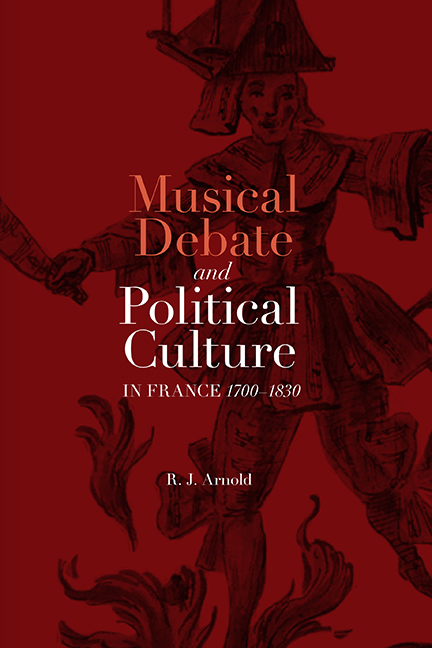Book contents
- Frontmatter
- Contents
- List of Illustrations
- Introduction
- 1 Parallels, Comparisons and Ripostes: The Raguenet–Lecerf Controversy, 1702–32
- 2 Spectators, Satirists and Sectarians: The Ramiste–Lulliste Querelle, 1733–51
- 3 'A Vast Negotiation': The Querelle des Bouffons, 1752–54
- 4 The Spirit of Contradiction: The Gluckiste–Piccinniste Querelle, 1774–88
- 5 A Revolutionary Interlude: 1789–1800
- 6 The End of the Party: New Avenues for Musical Dispute, 1800–30
- Conclusion
- Select Bibliography
- Index
- Music in Society and Culture
4 - The Spirit of Contradiction: The Gluckiste–Piccinniste Querelle, 1774–88
Published online by Cambridge University Press: 29 May 2021
- Frontmatter
- Contents
- List of Illustrations
- Introduction
- 1 Parallels, Comparisons and Ripostes: The Raguenet–Lecerf Controversy, 1702–32
- 2 Spectators, Satirists and Sectarians: The Ramiste–Lulliste Querelle, 1733–51
- 3 'A Vast Negotiation': The Querelle des Bouffons, 1752–54
- 4 The Spirit of Contradiction: The Gluckiste–Piccinniste Querelle, 1774–88
- 5 A Revolutionary Interlude: 1789–1800
- 6 The End of the Party: New Avenues for Musical Dispute, 1800–30
- Conclusion
- Select Bibliography
- Index
- Music in Society and Culture
Summary
EXACTLY twenty years passed between the end of the Querelle des Bouffons and the beginning of the next great outburst of discord. Scholars interested primarily in the ideological, philosophical and musicological content of these debates rightly point out fundamental continuities with earlier phases in the argument, noting the recurrence, mutatis mutandis, of familiar oppositions structured around melody versus harmony, Italy versus France, elite versus demotic modes of appreciation. The intervening years had, too, seen much vigorous discussion of opera, so it is perfectly feasible to see the querelle of the Gluckistes and the Piccinnistes as differing only in intensity from an essentially on-going argument. Nonetheless, when one examines the tone and texture of the dispute that took hold from 1774 it becomes clear that this was an episode with its own very distinct identity, expressive of attitudes, uncertainties and challenges associated with the new reign of Louis XVI and, as some have argued, of the senescence of the latter days of the Bourbon regime.
As in the previous querelle, the occasion for this dispute was a startling innovation in the repertoire of the Académie Royale de Musique – the premiere in April 1774 of Iphigénie en Aulide. This was the first French opera of Christoph Willibald Gluck, a German-Bohemian composer of considerable experience and renown who had produced a string of exclusively Italian operas for courts and opera houses around Europe, notably Milan, Naples, Dresden, Prague and Vienna. Gluck's advent in Paris had been long preached by advocates of operatic reform and was prepared by a careful campaign of publicity in the press. Iphigénie en Aulide was a sensation, and was followed over the next five years by a string of French operas that were scarcely less successful. The important aspect of this success was the sheer intensity of feeling that these works seemed to generate, by comparison with the studied appreciation generally customary at the Paris Opéra. Writing of Orphée, the salonnière Julie de Lespinasse was at a loss for how to describe her reactions to its music:
It was so profound, so sensitive, so lacerating, so absorbing, that it was impossible for me to put into words what I was feeling: I experienced the confusion, the happiness of passion, I needed to collect myself; and those who had not shared what I was feeling might have thought that I had lost my wits.
- Type
- Chapter
- Information
- Musical Debate and Political Culture in France, 1700–1830 , pp. 115 - 151Publisher: Boydell & BrewerPrint publication year: 2017

